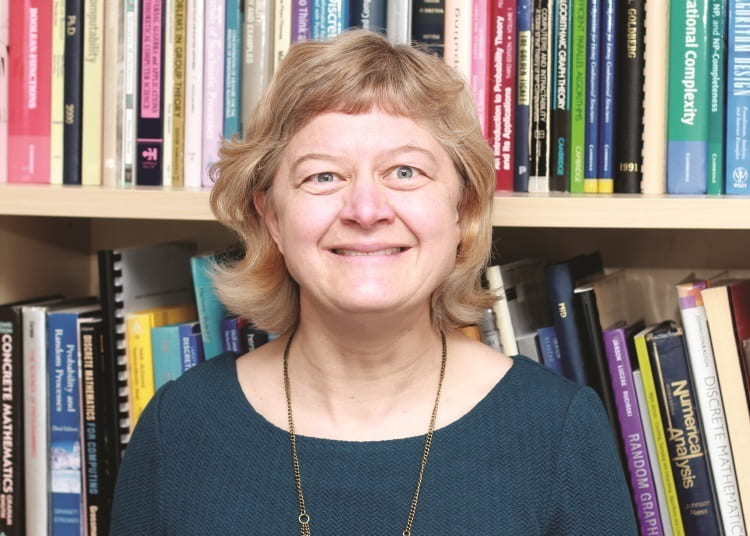On her way to becoming a constitutional lawyer, Leslie Ann Henderson Goldberg took a few computer science courses with the expectation of getting a side job to help pay for law school.
“I got into Computer Science by accident,” said the Rice University alumna (B.A. ’87). “I imagined it would be purely vocational and purely temporary. Then I discovered mathematics through computer science, and quickly became fascinated by open questions at the intersection of maths and CS.”
Goldberg had found her niche. Not only could she determine the best approach to complex computational problems, but she also had the tenacity required to dive deep and stay focused for the long term. Rather than law school, Goldberg was bound for graduate school.
Rice CS professor Corky Cartwright said Goldberg was memorable even though the young department was filled with brilliant students. She graduated summa cum laude, was named the outstanding student for both the CS department and the School of Engineering, and won a National Science Foundation Graduate Fellowship as well as a prestigious Marshall Scholarship.
Cartwright said, “Leslie has done very well and is now a Professor of Computer Science at the University of Oxford. At Rice, she was my undergraduate protégé, taking graduate-level courses in domain theory, which I no longer teach as it has fallen out of fashion. In her senior year, she received one of only 30 Marshall Scholarships awarded to U.S. students for graduate study in the U.K. She attend the University of Edinburgh, worked on probabilistic algorithms (a good choice!) and earned a Ph.D. in Computer Science.”
The University of Edinburgh appealed to Goldberg because it would give her the chance to complete her computational complexity research under the supervision of computational theorist and scientist Mark Jerrum. Goldberg became a prolific researcher and writer, and still collaborates with her mentor.
“A career in academia is satisfying because it combines both research and teaching,” said Goldberg. “The U.K. has a strong academic tradition and many good universities, so I’m happy remaining here. In particular, I love being in Oxford because of the excellent students.”
Three of those students are currently working with her on a research grant, “Mapping the Complexity of Counting.” Goldberg said the project focuses on “computational counting problems” which include problems such as computing the probability of an event, computing the expectation of a random variable or computing an approximate integral.
She said, “There are all sorts of applications, for example in statistical physics. In this field, the items of study are called ‘partition functions’ and these partition functions give qualitative information about spin models.
“The goal of the project (and of the wider research area) is to discover complexity characterisations, so that we can find out which computational counting problems are feasible, which are infeasible, and how changes in parameters affect feasibility.”
Although Goldberg doesn’t encourage her graduate students to pursue a specific career trajectory, the nature of their research lends itself to careers in academia rather than industry.
“My research is motivated by the ‘discovery of truth’ rather than by ‘building things,’ and this foundational research is mostly done in universities. So it is natural that most of my students have become academics –because of the nature of our research.”
Goldberg hasn’t lost any of the tenacity she discovered at Rice as an undergraduate. She still enjoys diving into deep problems and the satisfaction that comes through discovery and a thorough analysis.
She said, “Standing at the board with students and other research colleagues and finally solving a problem – especially after many months of trying – that’s a great day.”
That’s some side job.

